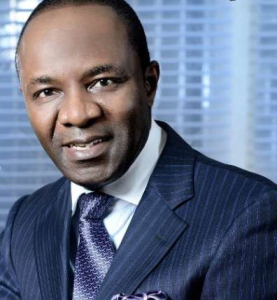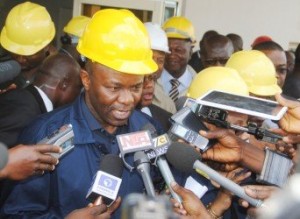Oil
Why NNPC needs a new GMD now

By Yemie ADEOYE
I acknowledge, in the ordinary course of government, that the exposition of the laws and Constitution devolves upon the judicial. But I beg to know upon what principle it can be contended that any one department draws from the Constitution greater powers than another in marking out the limits of the powers of the several departments.-James Madisson (June, 1789).
DALLAS TX-IT is an obvious fact today that some departments of government draw more powers than other departments of same government and all from one constitution, but even at that the fact as established above is that separation of powers is not negotiable, hence the creation of several departments of one government, this is true today even in our personal lives and businesses.
Prior to this era of change, the Nigerian National Petroleum Corporation (NNPC) has been and to a large extent still remains the cash cow of the Nigerian economy as virtually every sector of the economy, and sphere of government was funded either directly or indirectly by this mammoth organization, the largest of its kind south of the sahara.
The emergence of a new national government headed by Mr. Muhammadu Buhari of the former main opposition political party has however seen a more determined commitment towards economic diversification. Hence it has become important to de-emphasise the dependency on the state oil firm while committing resources to other prospective economic drivers. e.g Solid minerals, ICT, Power, agriculture etc.
This would of course come with its expectant effect on the NNPC, as to achieve this Government needs to maximize potentials of the National Oil Company. The NNPC has to become commercially viable and able to compete in the international market especially against other International and Multinational nad national oil companies.
To kick start this drive the President announced in August, the appointment of Emmanuel Ibe Kachikwu, an accomplished lawyer and Vice President Africa for Exxonmobil. Harvard trained, Kachikwu’s appointment was described in many quarters as a master stroke as he is from the igbo extraction, a group which is seen as marginalised by the current government, and he is also seen as a highly cerebral personality who has risen to the pinnacle of his career with the world’s largest publicly traded hydrocarbon company, Exxonmobil.
Not a few people believe that Dr. Kachikwu would be a breath of fresh air from his predecessor who was seen as anything but intelligent and innovative.
In the first few months of his appointment the GMD was focused! He quickly commenced a visit to the strategic business units (SBU’s) of the NNPC. He gave out deadlines to moribund refineries even if the deadlines aren’t feasible, but he went ahead regardless. He gave a new charge to the oil industry, initiating a review of the JV agreements to further maximize national gains, initiating the unbundling of the PPMC in to three strategic companies and making strategic committed moves to end the JV cash call frustrations.
Interestingly, earlier in November, the President apparently impressed by the GMD’s commitment, and achievements in just three months named him as Nigeria’s Minister of state for petroleum resources.
Sadly though, since assuming this post, politics seems to be sucking in this highly cerebral and seemingly dependable individual. He currently holds the post of Petroleum Minister (State) and Group Managing Director of the NNPC, this is seen by experts in the industry as a hindrance to the evolvement of the new NNPC, unbundled and commercially viable.
In Nigeria, it’s no news that a ministerial position is political; the minister is bogged down with political issues. He deals with stakeholders in the oil and gas industry both local and international; he formulates policies for government to drive the sector, serves as the regulator for the entire industry ensuring strict compliance through agencies of his ministry on both the NNPC and other oil companies operating in the country both local and international, he also deals with relevant committees of the national assembly and takes care of issues emerging from that unit of government with specific concerns and demands on the oil and gas sector, worse of all he deals . This is not to mention tons of international engagements as the country is a signature and member to different oil industry organizations and bodies around the world.
For the Minister to handle the above mentioned engagements with the same passion he displayed as GMD, he needs to focus!
While the minister is saddled with all the above engagements, the GMD would concentrate specifically on NNPC businesses, and ensuring that all SBU’s are functioning at almost optimal capacity. The GMD would also ensure that the Minister’s directive is carried effectively carried out. In all he is saddled with the direct operations of the NNPC and not the petroleum industry.
As this piece is being written, Nigerians across the 36 states of the country have been queuing for months to get petrol at the pumps. its been so excruciating for these innocent masses and the Minister amongst other international upstream commitments would still have to deal with this as GMD?
Definitely something has to give way if the minister must stay focused on his engagements. As it stands today, several appointments to either meet with the Minister for investment or other purposes are currently suffering as it is not an easy task to secure an appointment to meet with him.
An American business man who has operated in the oil sector for over three decades told BIZTELLERS on the condition of anonymity that severally he and his team have tried to meet with the “new gentleman” and have sent in a letter for that purpose but have been told severally that he was not in the country and decisions on a feasible date cannot be reached until he gets back. He had to be in Iran, Vienna, and Dubai etc. all on official matters. This was never the case while he held sway as GMD alone.
It has become highly imperative with seeming urgency for the Buhari administration to start shopping for someone with the kachikwu type of cerebral mindedness and avowed commitment to take over the affairs of the NNPC as the GMD.
This will enable the NNPC achieve those goals which the New minister has set before the corporation as soon as he was named GMD. Mr. President, This highly essential job cannot be done alone no matter how well intentioned.
Emmanuel Ibe Kachikwu cannot be a regulator in an industry where he is also a player. If the NNPC and by effect Nigeria must be taken seriously in the global oil and gas industry.
Oil
NNPC Targets 60% Methane Emission Reduction By 2031
The Nigerian National Petroleum Company Limited (NNPC) has unveiled a bold strategy to reduce methane emissions in the oil and gas sector by 60% by 2031, with an ultimate goal of achieving net-zero emissions by 2060.
This announcement reinforces Nigeria’s leadership role under the Global Methane Pledge initiative and its commitment to tackling climate change.
The Group Chief Executive Officer of NNPC, Mele Kyari, disclosed these plans during a meeting on Thursday with Robert Leahman, the U.S. State Department’s Global Methane Program Manager, and a delegation from Deloitte.
READ MORE: Atiku Gloats Over AUN’s Achievements Ahead Of 20th Anniversary
The discussions, held at the NNPC Towers in Abuja, focused on collaborative efforts to reduce methane emissions through innovative and sustainable practices.
“Reducing methane emissions is not just an environmental necessity but also a strategic imperative for Nigeria’s energy transition. We are leveraging partnerships to adopt global best practices and innovative solutions,” Kyari stated.
Key among these efforts is a pilot project in the Niger Delta, aimed at establishing emissions baselines, mitigating methane leaks, and promoting sustainable operations across Nigeria’s energy sector.
The project, a partnership between NNPC, Deloitte, and the U.S. Bureau of Energy Resources, will utilize data-driven methodologies to pinpoint and address methane hotspots.
Robert Leahman commended Nigeria’s proactive stance, describing it as a benchmark for other nations on the continent.
“Nigeria’s leadership under the Global Methane Pledge sets a standard for the continent. These initiatives will not only help reduce emissions but also drive sustainable development in the energy sector,” he said.
Kyari highlighted the broader benefits of addressing methane emissions, noting its significance for both environmental protection and economic efficiency.
“This collaboration is a game-changer. By addressing methane leaks, we’re reducing waste, saving costs, and protecting the environment. It’s a win-win for our economy and the planet,” he added.
Oil
FG Introduces New Incentives To Revitalize Nigeria’s Oil & Gas Industry
In a strategic move to revitalize Nigeria’s oil and gas sector, the Federal Government has unveiled two key fiscal incentives aimed at attracting investment and enhancing energy security.
The announcement was made by Mr. Wale Edun, the Minister of Finance and Coordinating Minister of the Economy on Wednesday.
The first initiative, the Value Added Tax (VAT) Modification Order 2024, introduces critical exemptions for essential energy products and infrastructure, including Diesel, Feed Gas, Liquefied Petroleum Gas (LPG), Compressed Natural Gas (CNG), Electric Vehicles, Liquefied Natural Gas (LNG) infrastructure, and Clean Cooking Equipment.
Read Also: Atiku Calls For Rotational Presidency Across Nigeria’s Geopolitical Zones
These exemptions are designed to reduce living costs for Nigerians, promote energy security, and accelerate the transition to cleaner energy alternatives.
The second initiative, the Notice of Tax Incentives for Deep Offshore Oil & Gas Production, offers new tax relief options for deep offshore exploration projects.
This measure aims to position Nigeria’s deep offshore basin as a premier destination for international oil and gas investments, boosting the country’s appeal to foreign investors.
These reforms are part of a broader set of policy initiatives, known as Policy Directives 40-42, endorsed by President Bola Ahmed Tinubu.
The directives reflect the administration’s commitment to fostering sustainable development in the energy sector and enhancing Nigeria’s competitive edge in the global oil and gas market.
Business
Tinubu set to approve ExxonMobil-Seplat oil deal, expands CNG bus initiative

By Yemie Adeoye
NIGERIA’s President Bola Tinubu has announced that the protracted ExxonMobil-Seplat upstream oil divestment will be formally approved by the Minister of petroleum within a matter of days, just as he announced his government’s intention to expand the Compress natural Gas, CNG buses initiative.
The President who stated this during his Independence day nationwide broadcast stated that the move is in line with his administration’s commitment to free enterprise, free entry and free exit in investments which is the hallmark of his administration investment policy.
“Fellow compatriots, our administration is committed to free enterprise, free entry, and free exit in investments while maintaining the sanctity and efficacy of our regulatory processes. This principle guides the divestment transactions in our upstream petroleum sector, where we are committed to changing the fortune positively. As such, the ExxonMobil Seplat divestment will receive ministerial approval in a matter of days, having been concluded by the regulator, NUPRC, in line with the Petroleum Industry Act, PIA. This was done in the same manner as other qualified divestments approved in the sector.”
The President also seized the opportunity to plead with Nigerians to be patient with his administration’s reform policies. “As your President, I assure you that we are committed to finding sustainable solutions to alleviate the suffering of our citizens. Once again, I plead for your patience as the reforms we are implementing show positive signs, and we are beginning to see light at the end of the tunnel”.
“Our energy transition programme is on course. We are expanding the adoption of the Presidential Initiative on Compressed Natural Gas for mass transit with private sector players. The Federal Government is ready to assist the thirty-six States and FCT in acquiring CNG buses for cheaper public transportation.
Fellow Nigerians, while we are working to stabilise the economy and secure the country, we also seek to foster national unity and build social harmony and cohesion. Our economy can only thrive when there is peace”. he enthused.



















